- Home
- Brigid Kemmerer
Letters to the Lost Page 8
Letters to the Lost Read online
Page 8
I keep wondering which is worse.
Her statement hits me right in the gut. I throw the phone at my pillow and storm into the bathroom. I shove the shower faucet with enough force that it creaks, and for half a second, I’m worried that I’ve broken something and water is about to start spraying everywhere.
I haven’t, and it doesn’t. Steam fills the bathroom almost immediately.
I squirt toothpaste with a vengeance and attack my teeth, but that hurts, so I dial back on the fury.
It takes effort. She keeps wondering which is worse? Like this is some kind of competition?
I slam the toothbrush onto the counter and spit into the sink, then wipe my face on a towel. My eyes are dark and angry in the mirror. I almost want to punch the glass.
Her words make me feel like a failure.
You could have stopped your sister’s death.
I’ve told myself the same thing for the last four years. The words shouldn’t have so much power. Not anymore. To hear them from her, though . . . All of a sudden, something that felt so safe feels like another opportunity for disappointment.
The water burns my skin when I step under the stream, but I let the pain run in rivulets down my back. The faucet runs hot for a good long while, and I force myself to take it. The heat on my skin takes some of the edge off my anger.
When I finally emerge from the bathroom, I smell bacon, but that’s insane. Alan is usually gone by the time I go downstairs, and Mom always sleeps late. It must be a neighbor.
The scent wakes my stomach, and suddenly I’m starving. It doesn’t help stave off my irritation. I stand at the foot of my bed and stare down at my phone.
Food first.
I leave my phone and move through the house like a ninja, well practiced in keeping silent in the morning so I don’t disturb my mother. I slide into the kitchen to grab a granola bar.
Mom is sitting at the table with Alan. I stop short.
If they were talking, their voices were low. They stop and look up at me in surprise.
They’re both in robes.
Any rage the shower bled off is back with full force.
Coffee mugs sit on the table in front of them. Used pans are on the stove, and food-caked plates are stacked in the sink. I smell eggs and see a few pieces of bacon soaking into a paper towel.
They had breakfast. Without me.
I don’t say anything to them. Instead, I grab a travel mug from the cabinet over the coffeemaker and pour myself a cup.
My mother speaks first. Her voice is quiet. “Good morning, Declan.”
I dump sugar into my mug. “Hi.”
Alan watches me. I ignore him.
“Are you hungry?” my mother says after a moment. “I could make you a plate.”
The way she says it makes me feel like an afterthought. Like until I appeared in the doorway, she’d completely forgotten I live here. “No.”
My spoon clinks against my mug when I stir cream into my coffee, and the silence behind me presses against my back.
I am starving, and it takes every ounce of self-control to avoid grabbing the remaining pieces of bacon and shoving them into my mouth.
When I turn around, Alan is whispering something to my mother. I have no idea what he’s saying, but it makes her giggle.
The rational side of my brain knows that they’re not giggling about me, but the insecure side wants me to punch him. I settle for glaring at him over my mug. “What are you doing home?”
He looks right back at me. “I thought I’d surprise your mother and take the day off.”
“We’re going to take care of some things around the house,” Mom says. “Then spend the afternoon together. Maybe see a movie.”
I stand there and fidget with the lid of the mug. I should go upstairs and get ready for school, but this whole interaction is leaving me groundless, like if I walk out of this kitchen, they’ll forget me altogether. “What kinds of things?”
“I’m going to power-wash the deck,” says Alan.
I could do that. I would do that, if she’d told me she’d wanted it done. She never asks me to do anything anymore. Alan does everything around here, and hell if I’m going to offer to help him. Every time I try, he acts like I’m a delinquent who can’t hold a screwdriver.
I set my jaw. “Sounds romantic.”
“If you think that’s romantic,” Mom says, “you can imagine how I feel about him taking the car to get it serviced.”
My grip on my mug tightens. “What’s wrong with your car?”
“My car,” says Alan. “Due for an oil change.” An element of challenge hangs in his voice.
He knows I could do that. It’s one of the things I’ve always done. In fact, I did it last May, right before their wedding.
Right before I totaled my father’s truck and set myself down this rutted path of failure and disappointment. They don’t need me. Alan is proving it right now.
I want to smack the smug look off his face.
I won’t pick a fight in front of my mother.
I can do that much, especially if it’s all I have left.
CHAPTER SIXTEEN
From: The Dark
To: Cemetery Girl
Date: Thursday, October 3 6:48:57 AM
Subject: Fate
You want to know what I believe? I believe in fate, but I also believe in free will. Meaning, there’s a path, but we’re free to veer away from it. The only problem is that there’s no way to know whose path we’re following at any given moment. Our own? Or fate’s? Other people are on their own paths, too. What happens when we intersect? What happens when someone else wipes our path clean, and we’re left with no road to follow? Is that fate? Is that when free will kicks in? Is the path there, but invisible?
Who the hell knows?
I’m not in the right mood for this conversation. Or maybe I’m tired. No one should have to discuss existentialism before 7 a.m.
One thing, though: You didn’t put your mother in that car, Cemetery Girl. She made that choice. Or maybe fate made the choice for her.
What’s important is that you didn’t.
I know that’s not very reassuring. I know a lot about anger and a lot about self-blame. We could reassure each other until our fingers fall off.
It doesn’t matter. We both know what we did.
Guilt is not a competition. Or at least it shouldn’t be.
Mr. Gerardi teaches an elective, so he doesn’t have a homeroom class, but I know from experience that I can usually find him in his classroom before the first bell. Students crowd the main hallways, making a racket of slamming lockers and shouting greetings, but down this hallway it’s quieter.
I haven’t been at school this early in forever. I’m usually sliding through the front doors right before the bell rings, but today I have a mission, so I pinned my damp hair into a twist and rushed.
Any other day I’d seek the quiet solitude the arts wing offers, but today I wish for the wild cacophony of the other students. The quiet lets my thoughts roam free, and they don’t travel in happy directions. The words from his email rattle around in my brain.
Was he mad at me? He seemed mad. I spent half an hour trying to puzzle out his tone. I didn’t think it was possible to sound encouraging, sympathetic, and pissed off all in one email, but somehow he managed it.
The classroom door is open, and I slide in without knocking. I need to rush, before I have a chance to trip over my anxiety.
Mr. Gerardi looks up in surprise. A student is standing beside him, showing him something in a notebook. She looks young. I don’t know her.
I flush. I didn’t consider that someone else might be here.
This is all wrong. I can’t do this.
“Sorry.” I edge toward the door. “I’ll just—I’ll come back.”
Mr. Gerardi comes out of his seat. “Juliet. Wait.”
“No—it was stupid. I’m going to be late for first p
eriod.”
“I’ll write you a note. Wait.”
I don’t wait. I walk out the door and stride toward the pandemonium.
My mother’s voice shames me. Have some courage, Juliet.
That’s the problem. I don’t have her courage. I never have. If she was a firecracker, spreading light across the sky, I’m a lit match, going dark before doing much of anything at all.
The thought makes my feet slow. Am I following a predetermined path? Or am I choosing to hide behind my grief?
I don’t like either of those options. I turn around.
Mr. Gerardi is in his doorway. I wonder if he was about to follow me—or if he was about to give up. I can’t read his expression. It’s some mix of disappointment and hopefulness.
It mirrors the way I’m feeling about myself. My fingers fiddle with the strap of my backpack. My voice is thready. “Just an hour?”
He nods like our conversation about photographs for the Fall Festival happened minutes ago instead of yesterday. He’s not going to make me spell it out.
I have to clear my throat. “And I can use your Leica?”
“I have it charging right now.”
I nod, then bite the inside of my cheek. The pain helps center me. “I’ll be back after the final bell.”
CHAPTER SEVENTEEN
From: Cemetery Girl
To: The Dark
Date: Thursday, October 3 8:23:05 AM
Subject: Choosing new paths
I didn’t mean to upset you this morning. You come across as having it all together, and I’m coming across like a complete freak who can barely tie her shoes in the morning.
But you’re right. Guilt isn’t a competition. I didn’t mean to make it sound that way at all. I meant that I wonder if this guilt would feel cleaner if I’d been a more active participant—but then I’m not sure how that would play out. It’s not like I would have pushed her in front of a car. It’s not like that’s what happened to your sister, either, right?
If I hurt you, I’m sorry.
I did want to tell you that your comments about fate inspired me. I did something unexpected. Not just unexpected to the people around me—I think showing up for school is unexpected at this point—but unexpected for myself. Everyone else is going to see this as some kind of turning point, I’m sure. Oh look, she’s back to herself.
What they don’t know is that I’m terrified.
That must mean I’m veering away from fate, right? Making my own way? Because the other path was a heck of a lot less frightening.
Mrs. Hillard is asking for volunteers to read their assignment from Tuesday. Each person has a paragraph interpreting the Dylan Thomas poem. It’s about darkness. It’s about nighttime. It’s about Alzheimer’s.
It’s about time for these people to get a clue.
I doodle on my notebook and tune them out.
Your comments about fate inspired me.
The words light a little glow in my chest.
“Declan, would you like to share your thoughts?”
I ignore her and keep doodling. Mrs. Hillard is looking at me expectantly; I can see her in my peripheral vision.
“Declan?” she says again. There’s no warning in her voice. She’s giving me the benefit of the doubt, acting like there’s some possible way I didn’t hear her.
It makes me answer her. “I didn’t do the assignment.” My voice is low and rough. She’s the first teacher to call on me all morning.
“Maybe you can answer my question from Tuesday on the fly, then. Why is Dylan Thomas desperate?”
Her tone is challenging, and it draws my eyes up. It reminds me of Alan because she’s daring me. My pencil stops on the paper. Her expression is even, and her eyes hold mine.
I don’t say anything. I can play this game all day.
The room falls silent as others pick up on the tension.
After a full minute, I realize she can play this game, too. Fine with me. We can all sit in silence. Like anyone is going to suffer because we won’t get to hear Andy Sachs tell us that Dylan Thomas was lamenting over blind people who couldn’t see lightning.
Over to my left, someone gives an aggravated sigh. It’s a guy, but I can’t tell who it is. Somewhere to my right, a girl shifts in her seat uncomfortably, then sighs, too.
People are beginning to glare. The tension in the room is dissolving into hostility.
Toward me.
Like that’s anything new.
Mrs. Hillard turns to her desk and picks up a pad of Post-its. She writes a quick note, then walks to my desk and sticks it over my doodle.
It says, Why don’t you give them something new to think about you?
I stare at it, and my pulse jumps. I think about the paths we choose. Cemetery Girl is right. This is terrifying.
I can’t look at Mrs. Hillard anymore. I peel the note off my notebook and crumple it into a tiny ball in my fist. I can’t make myself throw it away, however. I pick at the pointed edges. My chest feels like it’s been tied in knots. My tongue refuses to work.
After a moment, Mrs. Hillard returns to the front of the room. She gives a small sigh and sets her planner on top of her desk. She’s not looking at me anymore, and the room is still silent, waiting for one of us to break.
It’s going to be her. I can feel it.
“He’s afraid.” My voice almost cracks. I keep my fist clenched around that tiny ball of paper and my eyes locked on my notebook. “He’s afraid. That’s why he’s desperate.”
She doesn’t whip around. She simply turns, and her voice is as even as it was when she asked the question. “What is he afraid of?”
“He’s afraid of losing his father.” My hands are sweating, and I keep my eyes on that doodle. “He doesn’t want his father to die. He wants—”
She gives me a breath of time, then quietly says, “What does he want?”
“He wants him to fight it.”
“Does he feel his father’s death is inevitable or preventable?”
I finally look at her. My hands are shaking, but her expression is so steady that it’s like a lifeline. We could be the only people in the room.
“Inevitable.” I hesitate.
She waits, but I’m not sure what I was going to say after that.
The bell rings, and I explode from my seat. I barely pause to shove my notebook into my backpack.
Mrs. Hillard calls my name before I make it through the door, but my nerves are shot. I let the flow of students carry me into the hall, pulling me back to a familiar path.
CHAPTER EIGHTEEN
From: The Dark
To: Cemetery Girl
Date: Thursday, October 3 2:38:17PM
Subject: Unexpected
You don’t have to apologize. I should be thanking you. I followed your lead and did something unexpected.
You’re right. It was terrifying.
Let’s do it again.
Mr. Gerardi’s camera is smaller and lighter than my Nikon, and it feels unfamiliar in my hands. Mom wasn’t a Leica girl—she was a Nikon devotee, which I inherited. That said, they’re amazing cameras. Mom always said she’d buy me one if she ever won a Pulitzer.
I guess that’s not happening.
Music pours across the courtyard, a booming bass that shakes the ground. Students are everywhere, dancing in small packs, drinking punch and soda from red plastic cups. Card tables are scattered across the quad, offering school-spirit games and activities. Face painting. Pie eating. Cookie decorating. You’d think we were all six, but everyone else seems to be enjoying it.
I cling to the shadows under the trees, my fingers sweating on the plastic camera casing.
I have yet to take a picture.
Rowan appears beside me, blue and white swirls on her cheeks. Someone has braided her hair into twin pigtails and tied blue pom-poms at the ends. Her eyes sparkle. She’s thrilled that I’m doi
ng this. Like I told my cemetery guy, she probably hopes someone flipped a switch and turned me back into the best friend she remembers. “Let me see what you’ve got so far.”
“Nothing.” My voice is rough, and I clear my throat. “I haven’t taken any pictures yet.”
“Nothing?” Her easy smile slides away. “The festival started twenty minutes ago.”
I shift my feet. “I know.”
“What’s wrong?”
“I don’t know.”
She shifts closer to me. “Do you want me to find Mr. Gerardi? I can tell him you can’t do it.”
I swallow. “No. I want to do it.”
“Do you need some inspiration?” She makes a ghastly face at me, rolling her eyes back in her head and sticking her tongue out sideways. “Want to take a picture of this?”
A laugh escapes before I can stop myself.
When I catch it, it turns into a sob. I press my fingers into my eyes.
“Jules,” she whispers. Her fingers, featherlight, brush my forearms.
“I don’t remember how to do this,” I say.
“Yes, you do.”
“No.” I take a moment to breathe, because I don’t want to cry. Not here. Not now. “Everything feels wrong. It’s all so pointless.”
She studies me for a moment, then takes the camera out of my hands. Her hands gently lift the strap from around my neck, and suddenly I can breathe more freely.
Then, to my surprise, she puts the strap around her own neck. “Say cheese.”
“No! Ro—”
“Too late.” She holds the camera out to check the display, then frowns when she sees a bunch of codes instead of the image a point-and-shoot would offer. “Where’s the picture?”
“In the camera. Would you give that back to me?”
“No way.” She sidles away, lifting the camera again to point it at a group of senior girls who are giggling uncontrollably while doing a Rockette-style line kick. I barely hear the shutter click.
“Ro.”
She takes another picture, this time of a boy shoving his face into a pie plate filled with whipped cream. My fingers itch to grab the camera away from her, because the settings are all wrong for what she’s doing. I know she’s baiting me, but I’m sure she hopes some of these will end up in the yearbook. What she doesn’t know is that she’s just creating a big, blurred mess.

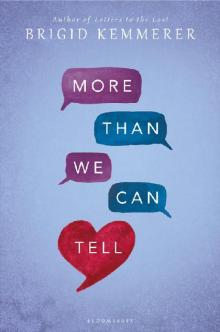 More Than We Can Tell
More Than We Can Tell Sacrifice
Sacrifice Fearless
Fearless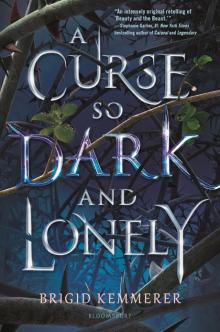 A Curse So Dark and Lonely
A Curse So Dark and Lonely Elemental
Elemental Thicker Than Water
Thicker Than Water Storm
Storm Spirit
Spirit Spark
Spark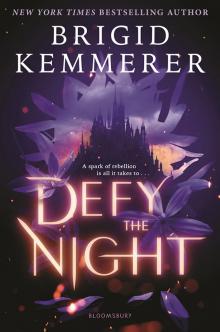 Defy the Night
Defy the Night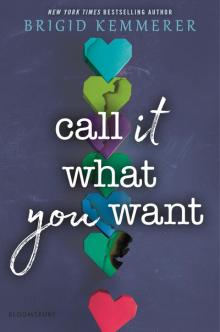 Call It What You Want
Call It What You Want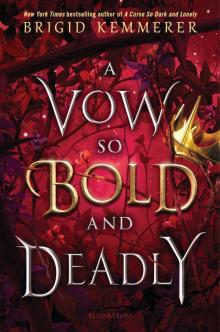 A Vow So Bold and Deadly
A Vow So Bold and Deadly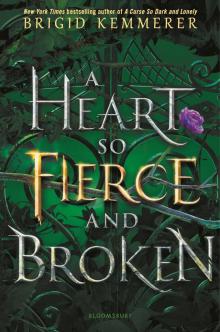 A Heart So Fierce and Broken
A Heart So Fierce and Broken Breathless
Breathless Breathless (Elemental)
Breathless (Elemental) Secret (Elemental)
Secret (Elemental)